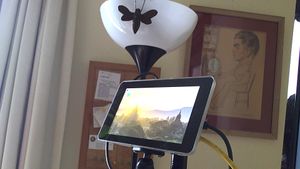Tenrec
Tenrec is a Raspberry Pi 4B

2020-May-09 arrived from Newark
I set it up as a build machine, with its faster processor and more RAM and SSD on USB3 it runs circles around violet (Pi 3B+) and of course my little Pi Zeroes.
Hardware
Cable management is always an issue with the Pi, they stick out everywhere! :-)

- Pi 4B with 4GB
- Seeed heatsink kit so cute, had to have one. Probably superfluous.
- 7" Pi touch screen from Element14
- Multicomp Pro case, clear
- Corsair GTX 240GB SSD
- Startech USB3S2SAT3CB USB3.0-SATA3 cable w/UASP (lsusb id is 174c:55aa with ASMedia ASM1053E chipset)
- Kensington USB3 hub
I drilled a couple holes in the bottom of the case, attached RAM mount hardware.
I got a Kensington USB3 hub and I run it on a separate 5V supply, so now it's powering the Apple keyboard and a Startech USB3 SATA cable.
The combination of USB3, SATA3, and a reasonably fast SSD is working well.
Quirks tests
set quirks=174c:55AA in /boot/cmdline.txt then run sudo ./Storage.sh and observe the results
Category Test Result HDParm Disk Read 162.96 MB/s HDParm Cached Disk Read 161.84 MB/s DD Disk Write 163 MB/s FIO 4k random read IOPS ( KB/s) FIO 4k random write IOPS ( KB/s) IOZone 4k read 15504 KB/s IOZone 4k write 23439 KB/s IOZone 4k random read 15545 KB/s IOZone 4k random write 21437 KB/s
With quirks turned off, it's faster
Category Test Result HDParm Disk Read 270.66 MB/s HDParm Cached Disk Read 265.18 MB/s DD Disk Write 166 MB/s FIO 4k random read IOPS ( KB/s) FIO 4k random write IOPS ( KB/s) IOZone 4k read 16087 KB/s IOZone 4k write 20849 KB/s IOZone 4k random read 16183 KB/s IOZone 4k random write 23324 KB/s
Screen and touch screen rotation
In this case, the 7" screen is upside down. You can fix this! https://raspberrypiprojects.com/raspberry-pi-rotate-touch-screen/ Also the image did not fill up the screen, perhaps it was defaulting to 640x480?
In /boot/config.txt,
lcd_rotate=2 framebuffer_width=800 framebuffer_height=480
On the login screen with these settings there is a white band on the right, one or two pixels wide but I don't care. It goes away after login.
Power
I had the lightning bolt low voltage warning almost continuously until I plugged in only a hub to the USB ports. I am using a 5V 4A switching supply and a USB-C cable. My power meter says it's pulling just over an amp. I kept turning up the voltage until the warnings stopped. About 5.4 volts. I suspect the cables are the real problem,
Software
2022-12-10 I have the current version loaded now, it seems fine. It's the one based on Debian Bullseye
2021-11-30 Today I am trying Ubuntu Server 64-bit, 21.10 I think it is. It works. The Raspios versions just white screened.
I have been using the Pi Imager, it is great. I have been installing directly onto a SSD instead of them wee SD cards.
Ubuntu settings
Locale? Try "dpkg-reconfigure locales".
sudo timedatectl set-timezone America/Los_Angeles
WiFi
With Ubuntu I cannot run raspi-config any longer. WiFi is in settings. It says WiFi is "unavailable". There are no "visible networks". It worked before I installed matchbox. Dang. I had to edit a file, the file 10-rpi-ethernet-eth0.yaml contains this:
network:
ethernets: {}
wifis:
wlan0:
dhcp4: true
access-points:
"wildsong":
password: "somethingaboutturtles"
I don't know what it is for but when I do
netplan try
it comes right up. It is still not visible in Settings->WiFi
Bluetooth works.
Ubuntu packages
emacs matchbox xinit
foxtrotgps navit gpsd
Matchbox
Autologin: Edit /etc/gdm3/custom.conf
Settings
-> Location services -> turn on (What is Mozilla Location Service?)
-> Privacy -> Screen lock -> Don't blank, don't lock screen. don't lock on suspend
How can I make the icons bigger?
What is Fractional Scaling
Audio
For ALEXA, do not install pulseaudio it makes her sound crackly and talk slowly. (Seriously weird.) I hacked around with pulseaudio because it was not working. I used some notes from here, on StackExchange.
I am using a Logitech camera for its microphone and the built in audio line out.
Adding X11
I installed the window environment on the SSD. Also it goes without saying, emacs.
sudo -s dpkg --configure -a apt update apt full-upgrade reboot apt install emacs-nox apt install xserver-xorg xinit apt install raspberrypi-ui-mods reboot
Now I have a lightdm login screen, so I log in.
VNC Server
Let's try
sudo apt install tigervnc-standalone-server
It will be installed as /usr/bin/vncserver
It supports "reverse" connections, which might possibly work with a reflector???
It is saying it needs a session manager when I run it
In raspi-config I am supposed to be able to turn on Real VNC Server but it fails. I think this works, but it will not work with the reflector so why bother?
apt-get install realvnc-vnc-server systemctl enable vncserver-x11-serviced.service systemctl start vncserver-x11-serviced.service
instead, I am trying tightvnc.
I probably have to start X11 running to make this work. This installs about 1000 packages. Sigh. The price you pay to run vncserver. For full description, see https://www.digitalocean.com/community/tutorials/how-to-install-and-configure-vnc-on-debian-10
Installing xfce4 as recommended in the above article will install pulseaudio, possibly breaking everything we need to make svxlink work. I should probably try matchbox instead. I guess it is running some version of Gnome, I don't care really.
apt-get install tightvncserver
Initialize the ~/.vnc settings by running "vncserver". Follow the instructions to set passwords. Then stop it by running "vncserver -kill :1"
I rebooted at this stage to see if I had hopelessly broken the computer. It's okay. My 7" LCD still does not work. I must have broken it at some point and it is staying broken.
Make it run after reboot,
sudo emacs /etc/systemd/system/[email protected] sudo systemctl daemon-reload sudo systemctl enable [email protected] # note the "1" which refers to the display
[Unit] Description=Start TightVNC server at startup After=syslog.target network.target [Service] Type=forking User=link Group=link WorkingDirectory=/home/link PIDFile=/home/link/.vnc/%H:%i.pid ExecStartPre=-/usr/bin/vncserver -kill :%i > /dev/null 2>&1 ExecStart=/usr/bin/vncserver <mark>-depth 24 -geometry 1280x800</mark> :%i ExecStop=/usr/bin/vncserver -kill :%i [Install] WantedBy=multi-user.target
Adding Squeezelite
http://www.winko-erades.nl/installing-squeezelite-player-on-a-raspberry-pi-running-jessie/
Adding Alexa
Sample code is in /home/pi/alexa/.
I did a clean build after switching from Violet (Debian Stretch) to Tenrec (Debian Buster). Finally I did the build on the console on Tenrec after trying a few times from remote SSH sessions that got interrupted by random life events like dinner and walks.
Wake word: | | Simply say Alexa and begin your query. | | Tap to talk: | | Press 't' and Enter followed by your query (no need for the 'Alexa').| | Hold to talk: | | Press 'h' followed by Enter to simulate holding a button. | | Then say your query (no need for the 'Alexa'). | | Press 'h' followed by Enter to simulate releasing a button. | | Stop an interaction: | | Press 's' and Enter to stop an ongoing interaction. | | Privacy mode (microphone off): | | Press 'm' and Enter to turn on and off the microphone. | | Playback Controls: | | Press '1' for a 'PLAY' button press. | | Press '2' for a 'PAUSE' button press. | | Press '3' for a 'NEXT' button press. | | Press '4' for a 'PREVIOUS' button press. | | Settings: | | Press 'c' followed by Enter at any time to see the settings screen. | | Speaker Control: | | Press 'p' followed by Enter at any time to adjust speaker settings. | | Firmware Version: | | Press 'f' followed by Enter at any time to report a different | | firmware version. | | Info: | | Press 'i' followed by Enter at any time to see the help screen. | | Reset device: | | Press 'k' followed by Enter at any time to reset your device. This | | will erase any data stored in the device and you will have to | | re-register your device. | | This option will also exit the application. | | Reauthorize device: | | Press 'z' followed by Enter at any time to re-authorize your device. | | This will erase any data stored in the device and initiate | | re-authorization. | | | | Quit: | | Press 'q' followed by Enter at any time to quit the application.
Hooking up some NeoPixels
https://www.instructables.com/id/Alexa-Assistant-With-a-10-Raspberry-Pi-Zero-W-and-/